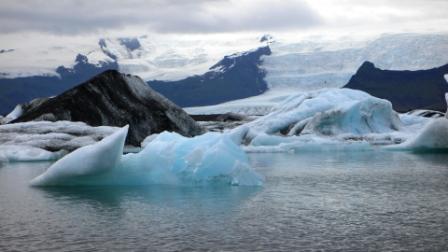 The old normal is gone, we are now watching an astonishing degree of unprecedented change happening in the Arctic. Chris Mooney writes in the Washington Post about the proceedings of a group a scientists who study Arctic climate system. They have been having a meeting in Washington DC at the National Press Club that was sponsored by SEARCH (the Study of Environmental Arctic Change).What they talked about should frighten us because so far 2016 is unlike any previous year ever seen …
The old normal is gone, we are now watching an astonishing degree of unprecedented change happening in the Arctic. Chris Mooney writes in the Washington Post about the proceedings of a group a scientists who study Arctic climate system. They have been having a meeting in Washington DC at the National Press Club that was sponsored by SEARCH (the Study of Environmental Arctic Change).What they talked about should frighten us because so far 2016 is unlike any previous year ever seen …
Walt Meier, a scientist with NASA who studies Arctic sea ice, laid out a series of “really extreme conditions” that began with sharply anomalous above-freezing temperatures at the North Pole for a short stint during the winter, and then led to large early breakups of ice above Alaska and in other regions. Overall, the Arctic sea ice extent has been at record lows for five out of six months so far this year.
“We’ve lost about twice the size of the state of Alaska in terms of area,” said Meier, referring to the long-term trend in Arctic sea ice over the past several decades. “It’s also thinning as well, we’ve lost about 50 percent of the thickness. And this is happening more rapidly than even the most aggressive climate models.”
A series of researchers covering other Arctic systems then proceeded to tell very similar tales:
* For Greenland, April through June temperatures were about 3 degrees Celsius above the long-term average, said Tedesco — a new high. “The surface temperature set new records for April to June 2016,” he said. The peak moment for Greenland melting each year is right around now, and it isn’t clear whether the overall loss of water will match a staggering more than 500 billion tons in 2012, but it is already possible to say that “2016 is among the top years for melting,” Tedesco said.
* For Northern Hemisphere snow cover, the spring of 2016 set a new record low, said David Robinson, who runs the Rutgers University Global Snow Lab. “We lost the snow earlier than any time in record … throughout the Northern Hemisphere,” Robinson said.
* For thawing permafrost — carbon-packed soil layers that have the potential to spill even more greenhouse gases into the atmosphere as they warm — 2015 showed “record high temperatures” in measuring sites in Alaska, said Ted Schuur, who studies permafrost and wildfires at Arizona State University. But preliminary indicators, Shuur said, “point toward 2016 being a new record year.”
* For the Northern Hemisphere jet stream, which appears to be becoming more wavy and loopy in nature as the Arctic warms faster than the mid-latitudes, conditions in 2016 have once again been ripe for strange behavior, said Jennifer Francis, an Arctic researcher at Rutgers. “The difference in the temperature change between the Arctic and the mid-latitudes is at an all-time record high,” said Francis. “This is what we call Arctic amplification.”
However, this perhaps is a rather key observation …
The most troubling aspect of all of this, and a recurrent theme of the talks, was the researchers’ emphasis on how changes in the Arctic are not necessarily linear in nature as global warming grows — once you cross the freezing point, notes Robinson, it’s a total phase change for water, plain and simple — and that the system is laden with feedback processes, which amplify themselves.
Conversations
The conversation in which we ask if climate change is really happening is over, it ended decades ago when it because clear that the planet was warming.
The conversation in which we ask if we ourselves are causing it also ended quite some time ago, we are. There may still be some who have doubts and suggest that it is not us, but is instead a natural cycle and has external causes. However the prevailing consensus is clear. Yes there are a few dissenters, but not one scientific body of national or international standing now maintains a formal opinion dissenting from the conclusion that humans are causing what we now observe.
Ecosystems have a considerable degree of reliance, but it is now quite probable that during this century the on-going change will exceed the capacity of many of these ecosystems to cope.
The conversation that now needs to take place is one that involves all of us taking decisive action to reverse the rapidly increasing concentrations of greenhouse gases in the atmosphere. The reality is that if deforestation and the burning of fossil fuels continues, then the inevitable climate change will devastate our current civilisation.
This is perhaps the greatest long-term threat to our very existence that we have ever faced.
Bottom line: Not only is doing nothing not an option, but the steps that we are already talking will not be enough.